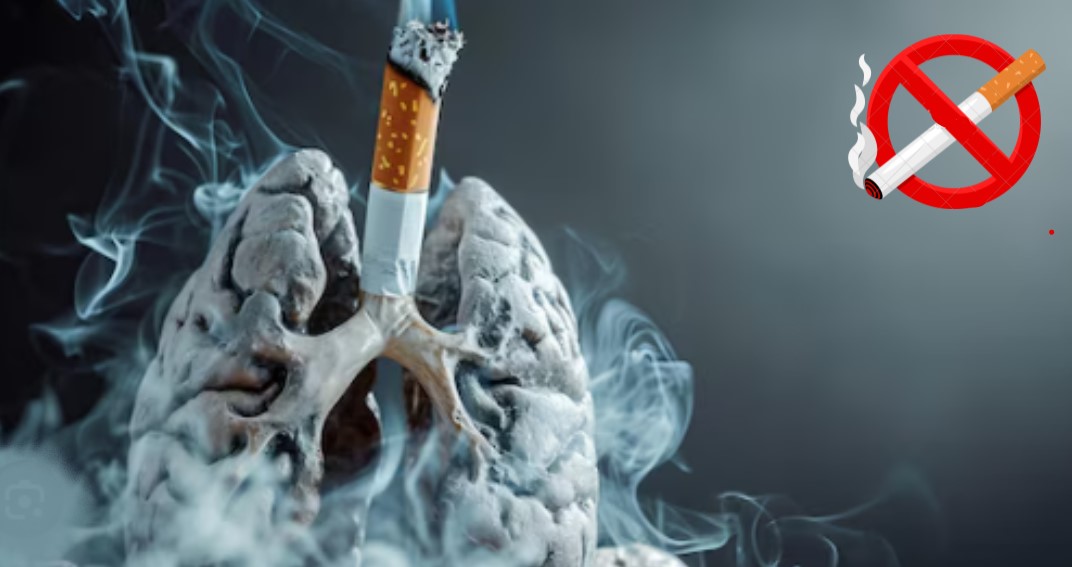By: Foluke Akinwalere. Freelance Health Writer. Medical review and editorial support provided by the DLHA Team.

Cartoon illustration: Ash tainted smoker's lungs on a butt of burning cigarette. Photo Credit: Freepik
Smoking or tobacco use remain one of the most preventable causes of illness and death worldwide. With over 7,000 chemicals in cigarettes/tobacco—many of which are known carcinogens—the health risks associated with smoking are staggering. Lung cancer, chronic obstructive pulmonary diseases (COPD), heart disease, and stroke are just a few of the devastating consequences. However, the good news is that quitting smoking, no matter how long you’ve smoked, can significantly improve your health and boost lung function.
In this article, you’ll learn about actionable steps you can take to quit smoking and rebuild your lung health; helping you lead a smoke-free, and healthier life.
Quitting smoking is more than just breaking a habit; it’s a life-saving-decision. Here are some of the most vital reasons you should quit smoking TODAY:
Quitting smoking is very challenging because it’s more than just a physical addiction; it’s also a psychological and behavioral habit. Understanding these challenges can help you prepare and develop ways to overcome them.
Nicotine is a highly addictive chemical compound present in a tobacco plant. It is present in all tobacco products, including cigarettes, cigars, smokeless tobacco (like snuff, dip, and chewing tobacco) and most e-cigarettes. It stimulates the release of dopamine (a feel good neurotransmitter) in your brain by creating a temporary feeling of pleasure and calm. Over time, your brain associates smoking with stress relief, making it harder to quit. [3]
Your daily routines, social settings, emotional states, often act as triggers for smoking. For example, you might associate smoking with your morning coffee, driving, or socialising with friends who smoke. Even seeing smoke-related items such as lighters, ashtray and other cigarette-related stuff can make you want to light up.
Quitting smoking is a unique experience for each person, but you will experience symptoms of smoking withdrawal. When you decide to quit, your body and brain need to adjust to the absence of nicotine. While this adjustment period can be uncomfortable, it’s important you remember that this withdrawal is not harmful unless you give in to the temptation to smoke.
These symptoms peak within the first few days but gradually decrease over time as long as you stay smoke-free.
Quitting smoking isn’t a one-size-fits-all process. However, combining multiple ways increases your chances of success. Here’re some tips on getting started:
Get help from you healthcare provider to set a specific and actionable date to quit smoking. This gives you time to prepare mentally and physically. Mark the date on your calendar and treat it as a commitment to yourself.
Reflect on the times and situations you’re most likely to smoke. Common triggers include:
Create a plan to avoid or manage these triggers. For example, if you smoke during breaks, plan alternative activities like taking a short walk.
Nicotine Replacement Therapy provides small, controlled doses of nicotine without the harmful chemicals in cigarettes. Options include:
NRT can reduce withdrawal symptoms and help you gradually wean off nicotine. Cost and ready availability may pose challenges for regular NRT use by many Africans.
Prescription medicines can be a powerful ally in quitting smoking, especially when combined with nicotine replacement therapy (NRT). Starting these treatments a few weeks before your Quit Day can set you up for success.
Talk to your doctor about which prescription medications may be best for you like:
Cost and ready availability may pose challenges for many Africans to access these drugs locally.
Behavioural therapy addresses the psychological aspects of smoking addiction. Options include:
Cost and availability of smoking cessation professional therapists may pose challenges for many Africans to access these services.
Replace the act of smoking with healthier habits, such as:
These are important aids to a successful smoking cessation commitment.
Surround yourself with supportive friends and family. Let them know about your decision to quit and ask for their encouragement. You can also join online forums or local support groups to connect with others who are quitting.
Quitting smoking sets off a chain of remarkable health benefits. From the moment you put out your last cigarette, your body begins to heal and transform, with positive changes that last for years. [4] Figure 1 illustrates the health benefits of quitting smoking, while Table 1 puts a time perspective to the benefits respectively
Fig. 1: Health benefits of quitting smoking. Click on image to enlarge. Photo Credit: CDC
Table 1: Health benefits of quitting smoking over time. Note that, in the “Benefits” column, risks described as dropping or decreasing highlight the health improvements that come with quitting smoking compared to continuing the habit. Click on image to enlarge
Quitting smoking is the first step toward better lung health. Here’s how you can further support your lungs:
Regular exercise improves lung capacity and strengthens your respiratory muscles. Aerobic activities like walking, swimming, or cycling are particularly effective.
Certain foods can promote lung repair and reduce inflammation. Incorporate:
Drinking plenty of water helps thin mucus in your lungs, making it easier to expel toxins
Breathing exercises improve lung function and oxygenation. Techniques include:
Limits your exposure to:
Consider using an air purifier at home to improve indoor air quality.
Visit your healthcare provider for regular checkups to monitor your lung health. Discuss any persistent symptoms like coughing, shortness of breath, or chest pain.
Relapse is common and you should view it as a learning opportunity, not failure. If you relapse:

Ernest Ajayi, Abuja, Nigeria Photo Credit: WHO, Nigeria
Ernest Ajayi, a 45-year-old civil servant from Abuja, Nigeria, shares how he started smoking, believing it made people appear successful, classy, and respected. [5]
He recalls being influenced by movies that often portrayed the wealthy and influential as smokers, which tempted him to pick up the habit in his early twenties while at university.
He said,
“I smoked an average of 10 sticks per day, but in some instances, up to 20 sticks, especially when drinking with friends or when angry. Despite the warning on the cigarette pack which says, “The Federal Ministry of Health warns that tobacco smoking is dangerous to health”, the message did not deter me from smoking as I was not aware of the benefits of quitting until I did.”
He came closer to quitting after experiencing persistent coughing every time he smoked. However, his resolve lasted only two months before he relapsed.
After more than 20 years of smoking, Mr. Ajayi finally quit in October 2020 when a serious illness became his turning point.
He recalled,
During my illness, I remember comparing pictures of a healthy lung and the smoker’s lungs shared with me by the doctors. I realised it was time to ditch tobacco smoking as it was not adding any significant prestige to my person as I could not smoke in the office, church, or some gatherings. This strengthened my decision to quit smoking. It was a challenging feat, but I have been determined to achieve it.”
Since he quit, he said he feels healthier and “realised I have not had bouts of cough, my blood pressure has improved, I now eat and sleep well and do not get tired as I did when smoking”.
He encouraged anyone trying to quit smoking to find a healthier alternative for those triggering moments.

Tiffany R. Photo Credit: CDC
Tiffany’s smoking journey was shaped by both heartbreak and hope. She started smoking menthol cigarettes in her late teens, drawn by the desire to fit in with her college peers. “On the college scene, a lot of kids I went to school with were smoking, and I wanted to fit in,” she recalls. Before she knew it, she was hooked, going through a pack of menthols a day. [6]
But her decision to quit was deeply personal. Tiffany lost her mother to lung cancer at 16, a painful experience that left her feeling scared, alone, and convinced it could have been prevented. Despite this, quitting remained a struggle for years.
Her turning point came when her own daughter turned 16, the same age Tiffany was when she lost her mom. That moment of connection gave her the push she needed.
“I didn’t want my daughter to think, “Wow, my mother loves cigarette smoking more than she cares about me,” says Tiffany.
Determined to quit smoking, Tiffany set a firm quit date and leaned on her family and friends for support. She transformed her daily routine, trading her early morning coffee-and-cigarette ritual for an extra hour of sleep. Every trace of smoking—cigarettes, ashtray—was removed from her home and car. To stay motivated, she carried a picture of her mother, a poignant reminder of the lung cancer that took her life.
Tiffany also made lifestyle changes to reinforce her resolve. She avoided social events that might tempt her to smoke, drank plenty of water, and took up regular exercise. To her surprise, she quickly felt more energetic and strong without cigarettes.
This time, quitting was different. The encouragement from loved ones played a huge role. They sent heartfelt cards that kept her spirits high with positive reminders, and called regularly to reinforce her commitment to a smoke-free life. With their unwavering support. Tiffany finally broke free from smoking for good.
Her greatest and most lasting motivation to quit was her daughter. She shares,
“She was so happy and so proud of me when I quit, she told me she had prayed that I would quit smoking. And I told her, ‘I quit because I want to be around you.’ I love her so much, and watching her grow up and thinking how successful she could be in her life, I can’t bear the thought of missing out on any of it.”
Hear Tiffany, in her own words: “How I Quit Smoking”
Quitting smoking is not just a decision to stop a habit, it’s a commitment to transforming your health and quality of life. Each day you choose to stay smoke-free, your lungs begin to repair themselves, your body grows stronger and your risk of severe health issues decreases.
While the road to quitting may feel challenging at times, remember that you are not alone. Whether through supportive friends and family, professional guidance, or tools like therapy and breathing exercises, there are countless resources to help you succeed.
The sooner you take the first step, the sooner you’ll reap the benefits of smoke-free life—clearer breaths, improved energy, and the peace of knowing you’re doing something incredible for yourself and those who love you.
1. World Health Organisation, The Tobacco Body, 31 May, 2019 [Internet] Accessed November 24, 2024. Available from here.
2. Datelinehealth Africa Inc. Fast Facts on Cigarette Smoking for Africans, Updated February 22, 2023 [Internet] Accessed November 24, 2024]. Available from here.
3. U.S. Food and Drug Administration. Nicotine Is Why Tobacco Products Are Addictive, [Internet] May 31, 2024 Accessed November 25, 2024]. Available from here.
4. CDC, Benefits of Quitting Smoking, May 15, 2024 [Internet]. Accessed November 28, 2024. Available from here.
5. World Health Organisation, I Quit Smoking To Live A Healthier Life, 02 June 2022, [Internet]. Accessed November 27, 2024]. Available from here.
6. CDC, Tips from Former Smokers: Tiffany R. Story, [Internet July, 26. 2023], [Internet] Accessed, November 28, 2024. Available from here.
Related:
Reducing Tobacco Use Health Burden in Africa Should be Public Policy Goal
Fast Facts on Cigarette Smoking for Africans
Overview of Vaping across Africa
Published: December 9, 2024
© 2024. Datelinehealth Africa Inc. All rights reserved.
Permission is given to copy, use and share content freely for non-commercial purposes without alteration or modification and subject to source attribution.
DATELINEHEALTH AFRICA INC., is a digital publisher for informational and educational purposes and does not offer personal medical care and advice. If you have a medical problem needing routine or emergency attention, call your doctor or local emergency services immediately, or visit the nearest emergency room or the nearest hospital. You should consult your professional healthcare provider before starting any nutrition, diet, exercise, fitness, medical or wellness program mentioned or referenced in the DatelinehealthAfrica website. Click here for more disclaimer notice.